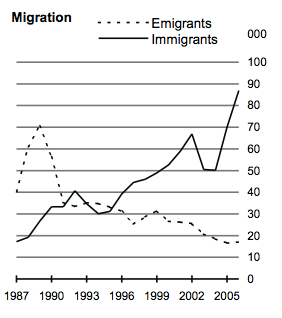 Like “Henry”:https://crookedtimber.org/2007/07/28/thousands-are-sailing/, I’m part of the last generation of Irish people to date for whom fleeing the country was a standard career path. I emigrated in 1995, coincidentally the year that the boom in immigration really began, and the era of significant net migration arrived. My usual impeccable timing, in other words. The scale of Irish emigration throughout the twentieth century is astonishing. From 1926 to 1961, the rate of emigration was sufficient to at least equal and usually significantly outweigh the natural rate of increase in the population, so that overall population numbers either stagnated or fell. Thus, despite the fact that the country’s “Total Fertility Rate”:http://en.wikipedia.org/wiki/Total_fertility_rate was over _three_ until the early 1980s, there were fewer than 150,000 more people living in Ireland in 1979 than there had been in 1901. The government conducted 14 censuses between 1926 and 2006. Of these, only four have shown positive net migration from the previous census, and three of those periods are since 1990: 1971-79 (+14 thousand), 1991-96 (+2k), 1996-2002 (+26k) and 2002-2006 (+42k).
Like “Henry”:https://crookedtimber.org/2007/07/28/thousands-are-sailing/, I’m part of the last generation of Irish people to date for whom fleeing the country was a standard career path. I emigrated in 1995, coincidentally the year that the boom in immigration really began, and the era of significant net migration arrived. My usual impeccable timing, in other words. The scale of Irish emigration throughout the twentieth century is astonishing. From 1926 to 1961, the rate of emigration was sufficient to at least equal and usually significantly outweigh the natural rate of increase in the population, so that overall population numbers either stagnated or fell. Thus, despite the fact that the country’s “Total Fertility Rate”:http://en.wikipedia.org/wiki/Total_fertility_rate was over _three_ until the early 1980s, there were fewer than 150,000 more people living in Ireland in 1979 than there had been in 1901. The government conducted 14 censuses between 1926 and 2006. Of these, only four have shown positive net migration from the previous census, and three of those periods are since 1990: 1971-79 (+14 thousand), 1991-96 (+2k), 1996-2002 (+26k) and 2002-2006 (+42k).
{ 7 comments }
Matt 07.28.07 at 9:16 pm
Just out of curiosity, do you know what percentage of the people listed as “immigrants” in the above chart are immigrants in the somewhat technical sense of people coming to the country with the intention to (and right to) remain permanently? My impression (from quite casual looking, I must say) is that many of the people moving to Ireland are perhaps more properly classified as migrant workers of one sort or another in that they have come to work, at least claim that they intent to return to their home countries in at least the middle run, and officially have no right to remain if they are not employed (that is, if they were to become public charges they would officially be deportable, though my impression is that in practice it’s even harder to deport someone on this ground in the EU than in the US, despite both EU and many member-state laws allowing for it.) My guess would be that many people who come with the intention of not staying for good will in fact stay for good (as has happened everywhere else) but I’d be quite curious to see what percentage of people entering and working in Ireland consider themselves to be immigrants and have a legal right to that status as it’s used in immigration law. Any idea?
franck 07.29.07 at 1:19 am
How is this affecting the Irish language? One might think that this would mean more monolingual English speakers, but since most immigrants to Ireland don’t have the poisonous relationship to Irish that many Irish people do, maybe it is even helping it. It seems to me the transition from being a poor, God-ridden, emigrant nation to a rich, secular, immigrant nation would make people value everything Irish more.
hallam 07.29.07 at 2:19 am
Surprise, surprise, the crossover point exactly coincides with the date that Ireland stopped obeying the dictates of the Catholic church on contraception.
Kieran Healy 07.29.07 at 2:22 am
I knew foreigners were to blame!
nick s 07.29.07 at 2:56 am
I saw Once this week, and it’s an interesting how Irish cinema offers snapshots of a rapidly changing country. There was ‘Celtic Tiger’ film — e.g. the worth-seeing When Brendan Met Trudy in 2001 — but I’m sure that Once is the first film to hit American shores that portrays the post-EU-enlargement Dublin.
(I also remember seeing a big uptick in people returning home to NI over the past five years. Are there comparable stats for the Republic?)
DC 07.29.07 at 6:10 pm
According to “The Irish Times Book of the Century”, by Fintan O’Toole, in the early 1920s “43% of Irish-born men and women were living abroad”. Not dure where he got the stat but if true it’s pretty impressive.
mollymooly 07.30.07 at 8:54 am
matt: what do you mean by “immigration status”? Ireland has no Green Card; but OTOH most foreign-born residents are from the EU and have the right of residence. Not sure what level of social welfare entitlement you get; but if you’ve been working you’ve been paying social insurance contributions so you should get something. An extended family of Roma were deported to Romania last week after living for several months intents on a roundabout above the M50 motorway.
Comments on this entry are closed.